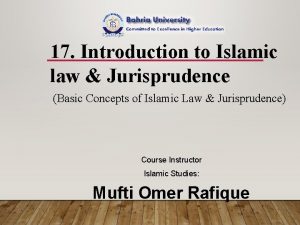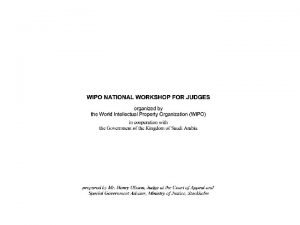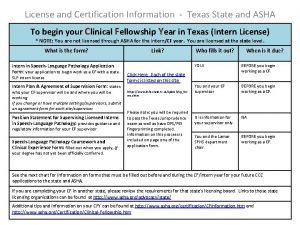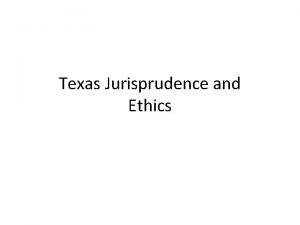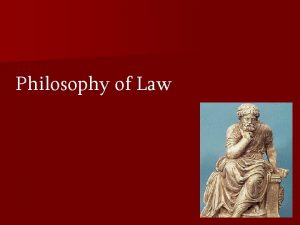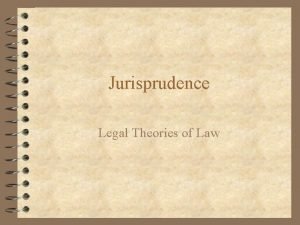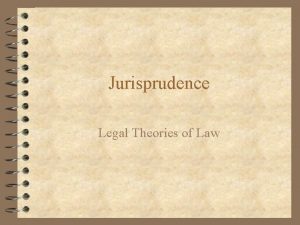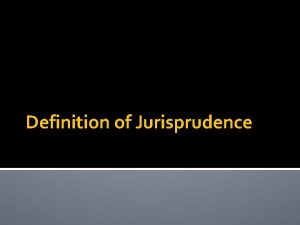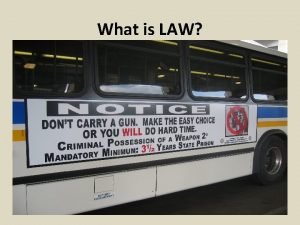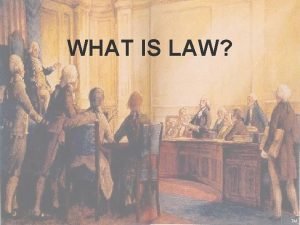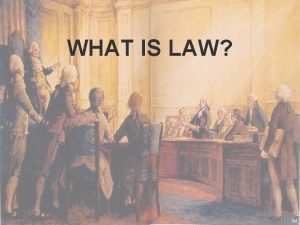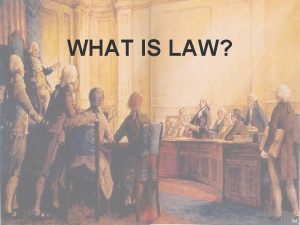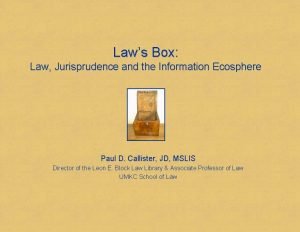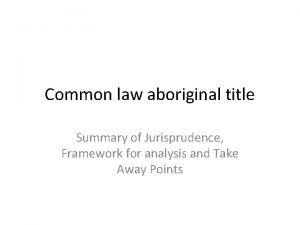What is Law Jurisprudence The Study of law















- Slides: 15

What is Law

Jurisprudence • The Study of law and legal philosophy

Laws and Values • Law generally reflect and promote a society’s values • Our legal system is influenced by what society considers to be right and wrong • Howeverything that is immoral is not criminal

Goals of our Criminal Justice System Protecting basic human rights Promoting fairness Help to resolve conflicts Promote order and stability Promoting desirable social and economic behavior representing the majority • Protecting the rights of the minority • • •

Laws and Values Continued • Laws can be based on moral, economical, political or social values • As values change, laws change • Many laws may combine moral, economical, political, and social values – Example: Laws against theft

Human Rights • Rights that all people have because they are human beings. • Both government as well as private citizens can violate human rights • Human rights are observed by almost every country in the world. – UDHR: Universal Declaration of Human Rights

Balancing Rights with Responsibilities • With every right there is a responsibility – Tried by a Jury of peers = Serve on Juries – Governed by elected officials = Vote – Have children = Provide for children – Drive vehicles = Obey traffic laws – Freedom of speech = Refrain from hateful and destructive comments – Police protection = Pay taxes – Etc… (Have students list 5 rights/privileges that they have along with the responsibilities)

Kinds of Laws • Criminal Law : – Regulate public conduct and set out duties owed by society – A criminal case is a legal action that can only be brought on by the government against a person charged with committing a crime – The person accused of the crime is called the defendant – Criminal laws have penalties and offenders are imprisoned, fined, placed under supervision or punished in some other way. – Felony: Penalty is a term of more than one year in prison – Misdemeanor: Penalty is a term of less than one year in prison

• Civil Law: Regulate relations between individuals and groups of individuals in society – A civil case is brought by the plaintiff – Civil Action: A law suit that can be brought on by an individual who feels wronged or injured by another – Class action: A law suit brought on by a group of people who feel to be wronged by a private corporation or government entity

Burden of Proof • In a criminal case, the burden of proof lie with the prosecutor • The prosecutor must prove their case beyond a reasonable doubt – The jury must be 99% convinced that the defendant committed the crime – OJ Simpson was acquitted • In a civil case, the plaintiff wins by convincing the jury by a preponderance of evidence – The jury must be 51% convinced that the defendant is at fault – OJ Simpson was found at fault in civil case and ordered to pay damages

Constitutional Framework • The US Constitution is the highest law of the land – It sets forth the basic framework of government – It list the government’s powers and limits on those powers – It list freedoms that cannot be taken away by government

• Limited Government – The national government has limited powers – The national government has authority to pass laws only in areas specifically listed in Article I of the constitution • Separation of Powers – Checks and balances

Checks and Balance • The Legislative Branch – Makes and passes Laws – Impeach the president – Vote for Supreme Court Justices • The Judicial Branch – Clarifies Laws based on interpretation of the US Constitution – Judicial review • The Executive Branch – Sign Laws into action – Veto a bill – Nominate Justices

Federal v. State Rights • Federalism – The division of power between the States and the Federal government • Bill of Rights – The first ten amendments to the US Constitution

The End
 Basic concept of islamic law and jurisprudence
Basic concept of islamic law and jurisprudence Scope of jurisprudence
Scope of jurisprudence Importance of jurisprudence
Importance of jurisprudence Asha certification
Asha certification Importance of forensic pharmacy
Importance of forensic pharmacy Rule 216 related to continuing competency
Rule 216 related to continuing competency Contoh aliran positivisme
Contoh aliran positivisme Aliran pragmatic legal realism
Aliran pragmatic legal realism Hình ảnh bộ gõ cơ thể búng tay
Hình ảnh bộ gõ cơ thể búng tay Bổ thể
Bổ thể Tỉ lệ cơ thể trẻ em
Tỉ lệ cơ thể trẻ em Chó sói
Chó sói Glasgow thang điểm
Glasgow thang điểm Chúa yêu trần thế alleluia
Chúa yêu trần thế alleluia Các môn thể thao bắt đầu bằng tiếng bóng
Các môn thể thao bắt đầu bằng tiếng bóng
